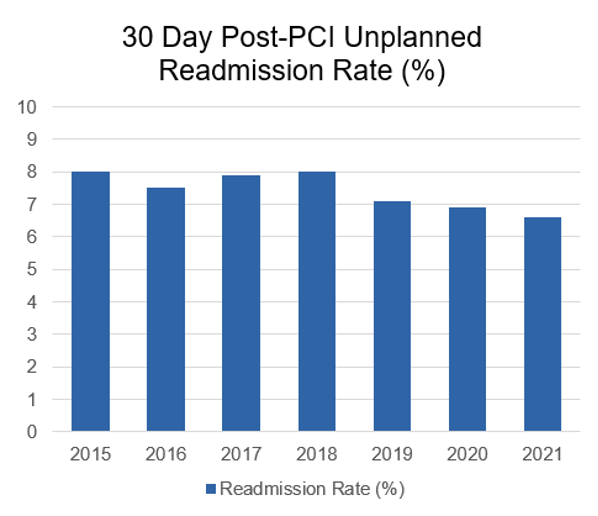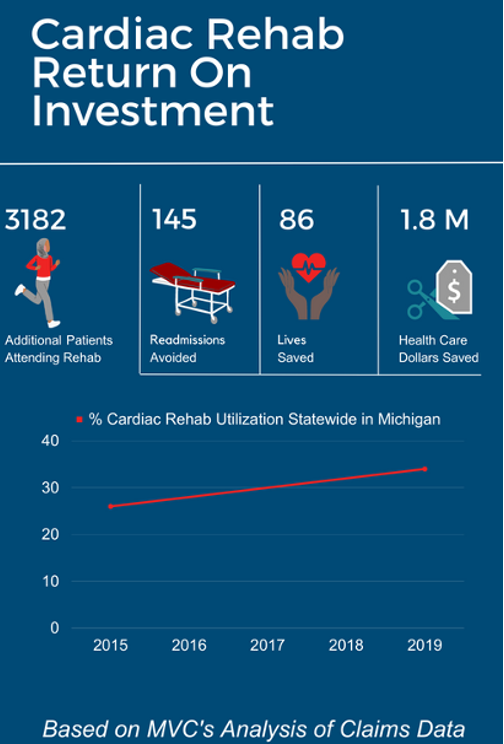
| |||
|
Reducing readmissions after heart procedures A multi-year quality improvement initiative results in fewer hospital readmissions after coronary revascularization procedures, improving long-term outcomes for patients and reducing health care costs. The issue Approximately 15% of patients are readmitted to the hospital within 30 days of a percutaneous coronary intervention), causing significant burdens to patients and health system services, despite estimates that more than 40% of readmissions may be preventable.1,2 Readmissions may be the result of actions taken or omitted during the index hospitalization stay, as well as overall care quality and coordination. Common reasons for readmissions include stent thrombosis, chest pain, heart failure, and bleeding. BMC2 takes action The Blue Cross Blue Shield of Michigan Cardiovascular Consortium, or BMC2, recognized this as an important quality improvement opportunity and implemented a multi-year initiative to decrease post-PCI readmissions. Beginning in 2017, consortium members began discussing site-level readmission data at collaborative meetings and sharing best practices amongst hospitals. In 2020, BMC2 launched a survey to gather data about site-level readmission prevention activities, then used those responses to foster discussion among collaborative-wide meeting attendees and hosted a national expert to present peer-reviewed data and share best practices on readmission prevention. BMC2 also began issuing special annual data reports to all PCI sites in 2021. BMC2 achieves a steady decline in post-PCI readmission since 2017 BMC2’s focus on readmissions since 2017 has impacted a steady decline in readmissions, at a rate of more than 1% annually. The estimated annual impact of that reduction is 250 fewer readmissions and $5.75 million in cost savings.3  BMC2 initiatives drive a downward trend in heart failure readmissions BMC2 has championed companion initiatives that also impact readmission prevention, including appropriate pre-PCI hydration, prescription of guideline-directed medical therapy for patients with heart failure, and implementation of quality improvement measures and incentive goals to drive cardiac rehabilitation utilization.  Sustaining change in 2023 While these achievements are important drivers of patient quality and cost management, BMC2 continues their focus on readmission prevention now and in the future. They’re planning an in-depth analysis on readmission and possible correlations in collaboration with the Michigan Value Collaborative, and are disseminating a patient-facing discharge instruction sheet designed to prevent unnecessary readmissions or ED visits. They’re also supporting hospitals as they work to increase enrollment in cardiac rehabilitation. About BMC2 BMC2 PCI is a collaborative consortium dedicated to improving the quality of care and outcomes in patients who undergo percutaneous coronary intervention procedures across the Michigan. BMC2 has collected information on more than 700,000 cases, performed by hundreds of physicians from 50 participating facilities since 1996. Support for BMC2 is provided by Blue Cross and Blue Shield of Michigan and Blue Care Network as part of the BCBSM Value Partnerships program. Although Blue Cross Blue Shield of Michigan and BMC2 work collaboratively, the opinions, beliefs and viewpoints expressed by the author don’t necessarily reflect the opinions, beliefs and viewpoints of Blue Cross or any of its employees. To learn more about BMC2, visit bmc2.org. For more information on the CQIs and other Value Partnerships programs, visit valuepartnerships.com. References
|
Blue Cross Blue Shield of Michigan and Blue Care Network are nonprofit corporations and independent licensees of the Blue Cross and Blue Shield Association. |